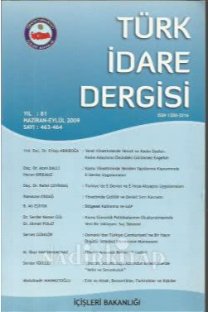KUZEY KIBRIS TÜRK CUMHURİYETİ HALKININ POLİS MESLEK ETİĞİ KAPSAMINDA POLİS ALGISININ ÖLÇÜLMESİ
1998-2001 yılları arasında Avrupa Polis Etik Kurallarının hazırlanmasının ardından birçok demokratik ülke bu kuralları içselleştirerek kendi polis etik kurallarını oluşturmuştur. Ancak, halen Kuzey Kıbrıs Türk Cumhuriyeti (KKTC) Polis Örgütünde oluşturulmuş polis etik kuralları bulunmadığı görülmektedir. Bu çerçevede, araştırmanın temel amacı KKTC Polis Örgütü mensuplarının yürütmüş olduğu görev ve hizmetlerin KKTC halkı tarafından ne ölçüde etik olarak algılandığını belirlemek ve halkın polislere yönelik etik algısını yükseltmenin temel unsurlarının neler olabileceğini ortaya koymaktır. Araştırma sonuçları,KKTC halkının, KKTC Polis Örgütü mensuplarının çok yüksek düzeyde olmamakla birlikte, etik olan davranışları sergilediği algısına sahip olduğunu göstermiştir. Ayrıca araştırma sonuçları faktör ve çoklu regresyon analizlerine tabi tutulmuş ve KKTC Polis Örgütü mensuplarının etik düzeyine ilişkin KKTC halkının algısını pozitif yönde yükseltmede en etkili faktörlerin sırasıyla; (1) polisin meşru uygulama ve müdahaleleri, (2) polisin masumiyet karinesine göre tutuklama ve soruşturmaları, (3) polisin profesyonellik bilinciyle görev ve hizmet ifası ve (4) polisin görevi ile ilgili çıkar sağlamaması olduğunu ortaya çıkarmıştır
THE MEASUREMENT OF THE PUBLIC’S POLICE PERCEPTION IN THE CONTEXT OF POLICE PROFESSION ETHICS IN THE TURKISH REPUBLIC OF NORTHERN CYPRUS
the years 1998-2001, many democratic countries have set up their own ethical rules of the police by internalizing these rules. It is notable to record that Police Organization in the Turkish Republic of Northern Cyprus (TRNC) is yet to have any Police Ethics Rules set. In this context, the main purpose of the research is to determine the extent to which the TRNC Police Organization members perceive the duties and services carried out by people of the TRNC as being ethical and to show what the basic elements of raising the public’s ethical perception towards the police can be. The results of the research reveals that the people of the TRNC have the perception that members of the TRNC Police Organization exhibit ethical behavior with not being at a very high level. In addition, the results of the research were subjected to factor and multiple regression analyzes and the most effective factors in raising the perception of Turkish Cypriot community on the ethical level of members of the TRNC Police Organization were as follows; (1) the legitimate practice and intervention of the police, (2) arrest and investigation of the police according to innocent presumption, (3) duty and service performance with the consciousness of professionalism of the police, and (4) police not making personal use of situation and tasks performed
___
- Altunışık, R., Bayraktaroğlu, S., Coşkun, R. ve Yıldırım, E. (2004). Sosyal Bilimlerde Araştırma Yöntemleri. 3. Baskı, Ankara: Sakarya Kitabevi, ss.113-116.
- Bowman, J. S. (1991). “Introduction: Ethical Theory and Practice in Public Management”, In Ethical Frontiers In Public Management: Seeking New Strategies For Resolving Ethical Dilemmas, Ed. James S. Bowman, San Francisco: Jossey-Bass.
- Crank, J. P. (1994). “Watchman and community: Myth and institutionalization in policing (in state theory, myths of policing, and responses to crime)”. Law & Society Review, V.28, ss. 325-352.
- Cevizci, A. (2010). Felsefeye Giriş. Ankara: Nobel Yayınları.
- Cevizci, A. (2012). Felsefeye Giriş. Ankara: Say Yayınları.
- Cyprus Police. (2013). Cyprus Police Website. http://www.police.gov.cy/police/ police.nsf/dmlethics_en/dmlethics_en?OpenDocument (erişim tarihi: 06 Mart 2013)
- Çağrıcı, M. (1985). Ana Hatlarıyla İslam Ahlâkı, İstanbul: Ensar Neşriyat.
- Denhardt, B. R, & Denhardt, J. V. (2009). Public Administration : An action Orientation, USA: Wadsworth Publishing Company.
- Erdem, H. (2003). Ahlâk Felsefesi, Konya: Hü-er Yayınları.
- Gökberk, M. (2008). Felsefe Tarihi, İstanbul: Remzi Kitabevi.
- Greene, J. D. (2004). Public Administration In The New Century: A Concise Introduction, Belmont, USA: Wadsworth Publishing Company.
- IACP. (2017). International Association of Chiefs of Police, http://www.theiacp. org/codeofethics (erişim tarihi: 07 Nisan 2017)
- İyi, S. (2012). “Etik Nedir?”, Ünite 1, Etik. Eskişehir: TC. Anadolu Üniversitesi Yayını No:2356, Açık Öğretim Fakültesi Yayını No: 1353, ss. 1-21.
- ISSN: 1300-3216
- Yayın Aralığı: Yılda 2 Sayı
- Başlangıç: 1928
- Yayıncı: İçişleri Bakanlığı
Sayıdaki Diğer Makaleler
KAMU YÖNETİMİNDE KİMLİK ARAYIŞI
CUMHURİYET DÖNEMİNDE ELEŞKİRT İLÇESİNİN İDARİ YAPISI VE NÜFUSU (1923-1970)
POLİTİKA TRANSFERİ VE TÜRKİYE’DE SAĞLIK ALANINDA DÖNÜŞÜMÜN BİR ANALİZİ
DİSİPLİN SUÇ VE CEZALARI İLE ETİK ARASINDAKİ İLİŞKİLERE
MEVZUAT YAPIMINDA DÜZENLEYİCİ ETKİ ANALİZİ VE UYGULAMA SORUNLARI
MİLLİ MÜCADELE DÖNEMİNDE AMERİKA’DA BİR SİVİL TOPLUM ÖRGÜTÜ: TÜRK TEAVÜN CEMİYETİ VE BİRLİK GAZETESİ
‘KENTLİ’ SIĞINMACILAR MESELESİ VE BELEDİYELER
Cenay BABAOĞLU, Mustafa KOCAOĞLU
MÜLKİ İDAREYE VE ÖZELLİKLE KAYMAKAMLIK MESLEĞİNE HALKIN BAKIŞI
